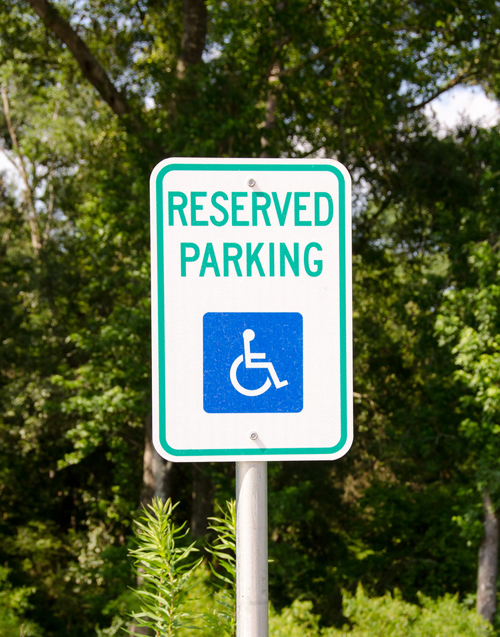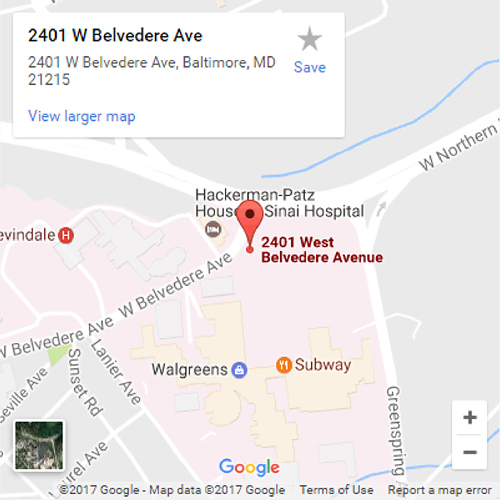Transportation during Treatment
Driving
Not all patients will be allowed to drive after surgery. You should not drive while taking pain medications. Even if your doctor gives you permission to drive during the final stages of treatment, you need to check with your car insurance company and local Department of Motor Vehicles (DMV) or Motor Vehicle Administration (MVA) regarding any legal implications of driving while recovering from leg or foot surgery.
A recent study by the American Academy of Orthopaedic Surgeons found that most insurance companies will not cover accidents in which the driver is still recovering from surgery. Some people choose to have hand controls or left foot accelerators installed in their vehicles; for more information, please contact Sinai’s Driver Evaluation and Training Program at 410-601-7360.
Handicap Parking Tags
 Many patients who have surgery on their legs are eligible for handicap parking tags.
Many patients who have surgery on their legs are eligible for handicap parking tags.
- Check with your Department of Motor Vehicles (DMV) or Motor Vehicle Administration (MVA) to find out whether they will accept the signature of a Maryland physician on the application for handicap parking tags. Some require the physician to be licensed in your state of residence or in a neighboring state. If they will not accept a Maryland physician’s signature, you will need to have your local physician sign the application for you.
- If your DMV or MVA will accept a Maryland physician’s signature, please bring your state’s application form with you. You might have to obtain the application from your local DMV or MVA or police station. Many states now allow you to download the forms from their web sites. Properly complete your section by listing the name of the person with the disability (even if the person is a child) and filling out the address section.
- If you are temporarily relocating to the Baltimore area, you can obtain temporary handicap parking tags through the Maryland MVA to use while you are here. You can find information and the application form at mva.maryland.gov.
Car Seats, Restraining Vests, and Positioning
- After surgery, the physical and occupational therapists will discuss with you how to position the patient in a vehicle.
- We are able to loan families car seats that are designed for children in spica casts and some types of fixators, and modified vests for children who cannot fit in a car seat. We have a limited number of these car seats and vests. Please contact the Pediatric Physical Therapy Department at RIAOPediatricTherapy@lifebridgehealth.org to determine whether one is available for you to borrow at the time of your child’s surgery.
- If we are not able to offer you a child seat at the time of need, the Pediatric Physical Therapy Department will need extra time prior to surgery to contact local loaning agencies either close to your home or in the Baltimore area to find a car seat that will fit your child’s needs appropriately. This takes time to process as the car seats are distributed between states on a regular basis and will need to be located and transported to your location.
- Your child is permitted to borrow the car seat or vest as long as needed. An approximate date of return will be discussed on the initial date of the loan. If your child will be having a spica cast removed, please email RIAOPediatricTherapy@lifebridgehealth.org when you have an official clinic appointment date for the removal. You are required to return the car seat during this visit. You can drop the seat off at the clinic on the second floor. Please remember to bring your personal car seat to be prepared for your drive after this visit.
- We can provide you with literature on restraining systems that use vests and harnesses if your child will not fit in a car seat. We have limited experience with these systems. One company that makes such products is E-Z-ON Products, Inc. Please email RIAOPediatricTherapy@lifebridgehealth.org for more information.
Transportation to Physical Therapy and to Follow-Up Appointments
Getting to and from therapy can be a big challenge, particularly if you have undergone surgery on both legs. Transportation must be part of your preoperative planning. We regret that the ICLL does not provide transportation to physical therapy appointments. If you stay at the Hackerman-Patz House, you will be within walking distance of the ICLL and will not require transportation.
If you stay at the Ronald McDonald House, they will provide limited transportation that might not always coincide with your scheduled appointments. Therefore, there might be times when you will need to provide your own transportation. If you stay at any other location, you will need to provide your own transportation by using your private vehicle, a car service or a wheelchair-accessible shuttle service. The Case Management Department at 410-601-5954 can provide information on wheelchair-accessible shuttle services.
